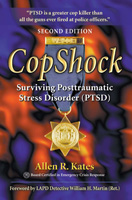
CopShock: Second Edition
Surviving Posttraumatic Stress Disorder (PTSD)
by Allen R. Kates, MFAW, BCECR
Police Political Groups
Getting officers help for combating PTSD often requires the influence and strength of political organizations. Police groups can negotiate, lobby and fight for better working conditions, training and trauma intervention programs.
Federal Law Enforcement
Officers Association (FLEOA)
FLEOA is the largest
professional association in the U.S. representing federal law enforcement
officers and criminal investigators from over 65 different agencies. Apart from
legislative involvement, FLEOA provides legal advice and representation to its
many members.
The FLEOA Foundation offers assistance to family members of
officers who are killed, provides scholarships to help students interested in
criminal justice and administers grants to select charities.
Go to:
http://www.fleoa.org. Write: FLEOA,
P.O. Box 326, Lewisberry, PA 17339. Phone: 717-938-2300.
Fraternal Order of Police
(FOP)
The FOP is the world’s largest organization of sworn
law enforcement officers with more than 2,100 lodges and over 340,000 members.
Besides legislative activities and numerous programs, it encourages the use of
intervention methods for police officers who experience trauma.
The
National FOP’s Critical Incident Committee promotes peer support, analyzes
critical incident needs and offers training programs. It is engaged in
pre-incident education to prepare law enforcement officers for the effects of
trauma. Departments in several states have organized Critical Incident Stress
Manage-ment (CISM) programs with the assistance of the FOP.
Go to:
http://www.grandlodgefop.org. Write:
Atnip-Orms Center, National Fraternal Order of Police, 701 Marriott Drive,
Nashville, TN 37214. Phone: 615-399-0900.
International Association of
Chiefs of Police (IACP)
The IACP is the world’s oldest and
largest nonprofit membership organization of police executives with over 16,000
members in ninety-four countries. Among its many goals, this group is dedicated
to improving the working conditions of the police profession. The IACP has
conducted conferences and training about the effects of stress and trauma, and
its policy center has developed related model policies to assist the law
enforcement community.
With over a century of experience, the organization
has credibility in all areas including government, the public and the media. As
well as offices in the U.S., the IACP maintains inter-national offices in
Europe, India and the Pacific/Asian region.
Go to: http://www.theiacp.org. Write: IACP,
515 N. Washington Street, Alexandria, VA 22314-2357. Call toll-free:
800-843-4227. Phone: 703-836-6767.
International Union of Police
Associations (IUPA)
IUPA has become one of the most
influential voices for law enforcement in the political arena. The union lobbies
in Washington on a wide range of issues, including police officer rights,
survivor benefits, overtime pay and armor vest grants.
To combat the
impact of trauma, the union retains a renowned police psychologist and expert in
the field of police stress to conduct educational stress seminars for IUPA
members and their families. The IUPA offers local unions research articles and
publications with the latest findings in the area of police stress.
The
IUPA has affiliates in Puerto Rico, the Virgin Islands and Canada.
Go to:
http://www.iupa.org. Write: IUPA,
1549 Ringling Blvd., Suite 600, Sarasota, FL 34236. Phone:
941-487-2560.
National
Association of Police Organizations (NAPO)
NAPO represents
the interests of more than 2000 police unions and associations, over 238,000
sworn officers and thousands of retired cops. In 1991, NAPO established the
Police Research and Education Project (PREP) to promote the well-being of police
officers and their families.
Go to: http://www.napo.org. Write:
NAPO, 317 South Patrick Street, Alexandria, VA 22314. Phone:
703-549-0775.
National Sheriffs’
Association (NSA)
The NSA is involved in many programs to
enable sheriffs, their deputies, chiefs of police and others in criminal justice
to perform their jobs in the best possible manner. It monitors legislation and
provides training for its members.
Go to: http://www.sheriffs.org. Write:
National Sheriffs’ Association, 1450 Duke Street, Alexandria, VA 22314-3490.
Call toll-free: 800-424-7827. Phone: 703-836-7827.
National Trooper’s Coalition
(NTC)
One of the many goals of the NTC is to assist member
state police associations in acquiring the best possible equipment, salaries,
pension, fringe benefits and working conditions. The organization is very active
in lobbying Washington and conducts seminars on important issues to state
troopers.
Go to: http://www.ntctroopers.com. Write: NTC, 1308 9th Street, NW, Washington, DC 20001. Phone:
202-387-1682.